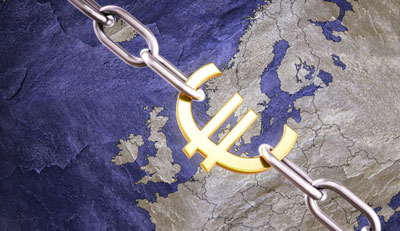There’s a simple solution to Greece’s problems, but Europe won’t try it

An interview by Ezra Klein
Adam Posen is president of the Peterson Institute for International Economics and, like every international economist right now, he’s glued to the drama in Greece. There is, he says, a simple solution to the crisis: the Northern European countries should write a check and end it. But they won’t, and in a conversation on Monday, he told me why. The interview has been lightly edited for length and clarity.
Ezra Klein: Imagine I haven’t been following this at all. What’s the simplest explanation for why the world is so concerned about Greece today?
Adam Posen: The simplest explanation is that for the euro to remain together, and therefore to remain a stable currency, you have to believe the membership pays their debts. Right now, the Greeks are not going to pay back what they owe the rest of Europe. Right now, there literally aren’t enough euros in the Greek financial system, public and private, to pay back what they owe.
So Greece will have to issue IOUs to their creditors and their businesses. And that will mean you have a currency in Greece that is not the euro. It will be a kind of scrip. And so the Greek people have been pulling their money out of the Greek financial system because they don’t believe this scrip will be worth as much as the euro.
The way we deal with this kind of problem in the US is we have fiscal transfers. Mississippi and Alabama never really pay back what they owe California and New York, and that’s okay. So you can see the crisis in Greece two ways: you can believe it’s a failure because the Greeks are reneging on their debts or because Germany is not treating Greece like the US treats Mississippi, as a state they have to look after.
EK: Why is this happening right now though? What’s changed from, say, six months ago?
AP: What has changed since a year ago is a breakdown in trust and a change in politics. The economic fundamentals really haven’t changed. But you have this new government in Greece that is taking a harder line with its creditors. They’re saying, basically, we can’t pay all this back, you need to be more realistic. And the European leadership has reacted to this first by saying, sorry, that deal is not on the table, and second, by saying, we basically just don’t trust you. You’ll tell us one thing and then go do something else.
So that’s the key: the economics didn’t change. It was a change in the Greek government, and then a change in the relationship between that government and the rest of Europe.
EK: One thing that makes this hard to follow from the US is it’s not entirely clear which outcome to be rooting for. Greece can stay in the euro and try to endure grinding depression for years and years or they can leave the euro and endure a financial crisis. Which outcome is better?
AP: It’s easy to say what people should want to happen in Greece. It’s just impossible to get there. The Northern Europeans should write a check and make this go away. They should accept the fact that Greece is not going to pay most of its debts. They also need to accept that these debts are partly their fault. These loans were made by Northern European financial institutions, and the Northern Europeans should suffer for making stupid loans, too.
But that won’t happen. Northern European governments like Germany, Finland, Austria, the Netherlands, and Sweden don’t want their banks to lose money and they don’t want to tell their voters that they’re handing money to the Greeks.
EK: You often hear about how the Greek government is barely able to collect taxes. How big a contributor is that to this crisis?
AP: There is no question that the Greek system has done a terrible job of collecting taxes, and especially collecting taxes on the richest people. For instance, shipping is constitutionally protected from being taxed, and that’s where many of Greece’s great fortunes are. Taxation on real estate is also poorly collected. But in terms of Greece racking up all its debt, that isn’t the fundamental issue. The fundamental issue was the surge in capital from Northern Europe to Greece during the early and mid-2000s. Even if the Greeks hadn’t been able to collect much tax revenue they couldn’t have gotten into so much debt if people weren’t giving them all these loans.
EK: What do you think the financial consequences of Greece leaving the eurozone would be?
AP: I think the short-term consequences are going to be much smaller than people fear, with the huge, horrible exception of the Greek people themselves. It will be awful for them. But pretty much all the Greek debt is now in government hands. The total amount of debt, which is about $200 billion euros, is real money, but it’s really just about 1-2 percent of total euro area GDP. And every bank and every investor has known this has been coming for months.
But that’s the short term. The long-term is the IMF will be out billions of dollars which they need to pay back to their poorer members. The euro will be seen as less safe a currency than it once was and that will permanently raise interest rates in many European countries. It will permanently reduce the appetite for euro assets. And it will mean that the so-called periphery countries in Europe — notably Portugal — will be looked at with suspicion going forward. And that will make it harder for them to get investment and funding.
EK: What about the political side of it? Do you think this raises the possibility of dangerous political backlash in Europe?
AP: Absolutely. Branko Milanovic had a nice essay about how bad the politics of Europe could get in the aftermath of this. It’s a bit extreme but it’s a good point. Basically what you’ve had is the undermining of European solidarity. There is this level of distrust and resentment. The Greek people feel the Northern Europeans are trying to get blood from a stone and the Germans feel they’re being exploited.
Source: Vox – There’s a simple solution to Greece’s problems, but Europe won’t try it




























